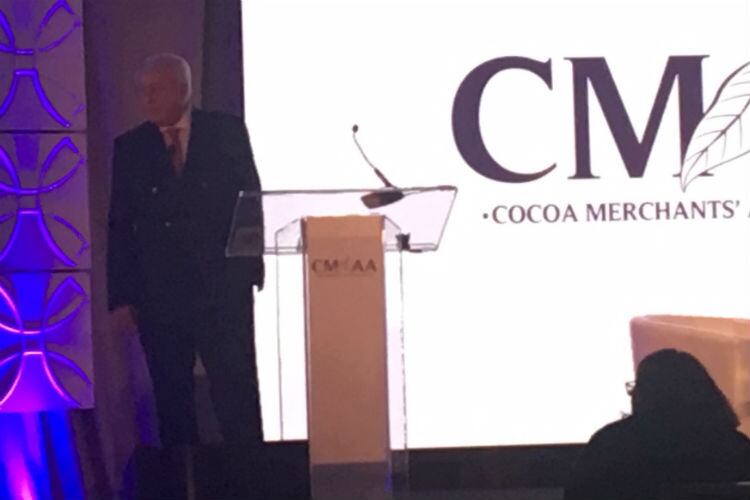Derek Chambers, a cocoa trader with 50 years’ experience in the market, has hit out at the industry for low cocoa prices and duplication in sustainability programs.
He told the Cocoa Merchants Association of America at their conference in Miami that while the industry was not responsible for low cocoa prices and not responsible for poverty, child labor and deforestation … it is guilty for not fighting against environmental groups” and accepting what he called “bad science”.
'Stop the circus'
“Certification is a waste of money,” he claimed. “Stop the circus, and the millions spent on meetings and consultants and reports that say the same thing because they are a waste of money”.
Trade bodies and industry figures should spend the money instead on getting the governments of producing countries to “do the right thing, and support them in getting them done”, Chambers said.
“In West Africa, cocoa farmers are not poor because they grow cocoa, they grow cocoa because they are poor. Cocoa is a convenient cash crop that allows income all the year round. All cocoa farmers need help, not just those lucky enough to be supported by programs run by various chocolate companies,” he said.
There can be no sustainable future for cocoa unless prices are higher
According to Chambers, who was speaking in a personal capacity, the government of Cote d’Ivoire could raise the price it paid to its farmers by over $300 a ton by abolishing its 14.6% export tax. “It chooses not to, as it is democratic right”, he said - but getting rid of the tax would mean $600m would go straight to the country’s cocoa farmers.
He continued his attack on the cocoa industry by calling for all chocolate companies to stop their direct or indirect involvement in countries of origin and in certification, “because they will always be under the suspicion that all they are trying to do is prompt an increase in production and perpetuate low prices”.
He also criticized certain bodies and organizations for claiming cocoa has driven deforestation. “It’s not the cocoa farmers destroying tropical trees. The responsibility of the cocoa farms lies firmly on the shoulders of cocoa producing counties,” he said.
He also argued that no amount of money thrown at sustainability or solutions from civil societies will work unless producing countries manage their own production.
Cocoa prices are too low to ensure sufficient production in the future to meet growth in consumption, which will accelerate because of the low prices. “There can be no sustainable future for cocoa unless prices are higher,” he warned.
Minimum price
Stimulating an increase in production faster than the increase of consumption will not work. Withholding cocoa from the market does not work, storing cocoa for a an extended period of time does not work, creating a minimum price for cocoa does not work, it quickly becomes a maximum price, he claimed.
He also said that taking the money from profits of chocolate companies should be more politically acceptable. Instead of duplicating sustainability schemes, Chambers called on companies to pay $100 per ton of cocoa into a foundation from their profits, which would raise $460m a year.
“A serious amount of money and the foundation should define what it wants from origin producing countries and consuming areas such as the EU and use a ‘carrot and stick approach’ to get it done.”
With 50 years in the business, Chambers said he was passionate about cocoa and is still involved in mentoring the next generation of cocoa traders at Sucden.
But he was saddened by how the cocoa industry is attacked by activists “trying to make a name for themselves to justify their own existence”.
He told the CMAA, “the chocolate industry has nothing to apologize for. It brings joy to millions of people, brings work to millions of people, and has goodness in its D&A dating back to its Quaker roots in England. Chocolate does not pollute, does not kill.”
He said the chocolate industry is an ‘easy target’ and has to spend million of dollars each year to defend itself when the money could be much better served being used in other areas such as research & development.
Chambers said he did expect cocoa prices to rise in production and consumption that should grow by at least 100,000 tons a year. He thought it unlikely there will be a substantial surplus to allow lower prices.
“There is no excuse for the chocolate industry to buy at a higher level and they will be doing a disservice to their shareholders and consumers if they do not buy as much cocoa as is available and and keep on buying,” he told the cocoa merchants.
- This article was amended on Friday March 8 to make it clear that Chambers stated that "the cocoa industry was not responsible for low cocoa prices or responsible for poverty, child labor and deforestation … it is guilty for not fighting against environmental groups” and accepting what he called “bad science”.

